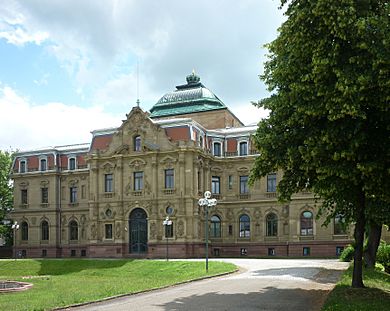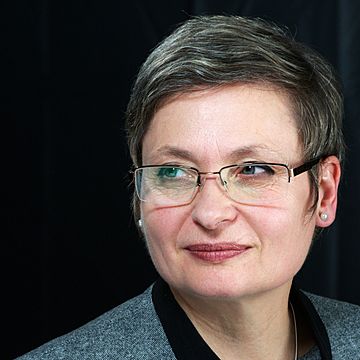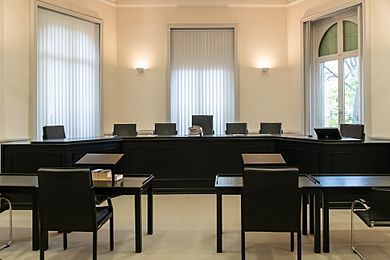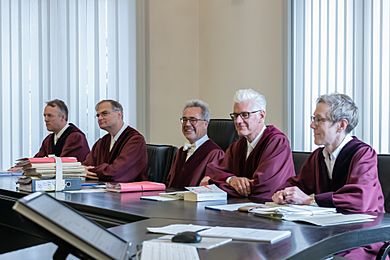Federal Court of Justice facts for kids
Quick facts for kids Federal Court of Justice |
|
|---|---|
| Bundesgerichtshof | |
 |
|
| Established | 1 October 1950 |
| Location | Karlsruhe and Leipzig |
| Composition method | Election by Judicial Selection Committee |
| Authorized by | Basic Law of Germany |
| Number of positions | 153 judges (as of 15 January 2023) |
| President | |
| Currently | Bettina Limperg |
| Since | 1 July 2014 |
| Vice President | |
| Currently | Jürgen Ellenberger |
| Since | 2 December 2016 |
The Federal Court of Justice (also known as the BGH) is Germany's top court for civil and criminal cases. Its main job is to check decisions from lower courts to make sure they followed the law correctly. Even though its decisions are officially only for one case, other courts usually follow its lead. Only Germany's highest court, the Federal Constitutional Court, can change a BGH decision if it goes against the German constitution (called the Basic Law).
Some judges at the Federal Court of Justice also act as special investigators. They handle serious criminal cases, like those involving crimes against humanity or terrorist groups. They are responsible for issuing things like search and arrest warrants.
Germany has different top courts for different types of law. The Federal Court of Justice has four sister courts:
- The Federal Administrative Court for government-related issues.
- The Federal Fiscal Court for tax matters.
- The Federal Labor Court for workplace disputes.
- The Federal Social Court for social security matters.
The main location of the Federal Court of Justice is in Karlsruhe, a city in Germany. Two of its criminal sections are located in Leipzig.
Contents
A Look Back: The Court's History
Older Courts That Came Before
The idea of a top court in Germany goes way back to 1495. That's when the Reichskammergericht was created for the Holy Roman Empire. It was one of two top courts at the time, with the Emperor's own court handling criminal cases.
When the Empire ended in 1806, these courts closed. For a while, each German state had its own independent courts. This changed when the North German Confederation was formed. In 1870, the Bundesoberhandelsgericht started in Leipzig. It mostly handled trade law cases. When the southern German states joined to form the German Empire, this court (now called Reichsoberhandelsgericht) took on more civil law cases.
In 1879, the Reichsoberhandelsgericht was replaced by the Reichsgericht, also in Leipzig. This new court had a much wider role, covering all civil and criminal cases in the Empire. After Germany lost World War II, the Reichsgericht and all other German courts were closed in 1945.
In the British part of Germany after the war, a Supreme Court for the British Zone was set up in 1948. Its job was to make sure laws were applied the same way across the zone. Another court, the German High Court for the Combined Economic Area, handled economic law.
How the Federal Court of Justice Started
In May 1949, Germany's new constitution, the Basic Law, was created. It said that new top federal courts should be established for different areas of law. About a year later, the German parliament (the Bundestag) decided that the top court for civil and criminal cases would be called the Bundesgerichtshof (Federal Court of Justice). They chose Karlsruhe as its main location after much discussion.
The Federal Court of Justice officially began on October 1, 1950. Cases from the old Supreme Court for the British Zone were moved to the new court. At first, only 12 judges were appointed, but this number quickly grew to 86 by July 1952. This was because the court had more work than expected and its responsibilities grew.
Where the Court Is Located

The Federal Court of Justice is located in five buildings within a park-like area in the center of Karlsruhe. The main building is the Hereditary Grand Ducal Palace, built between 1891 and 1897. Parts of it were damaged during World War II.
In the 1990s, the Federal Prosecutor General's Office, which works closely with the court, moved into a new building nearby. In 2003, an extension building was opened, which includes a large library and the Museum of Legal History. A new reception building with a large courtroom was added in 2012. Before that, the garden was even used as a helicopter landing spot for people being brought to court.
The court also has two smaller offices in Karlsruhe. Since 1997, one of its criminal sections has been located in Leipzig, and another criminal section joined it there in 2020.
The Judges of the Court
What Judges Need to Be
To become a judge at the Federal Court of Justice, a person must be a German citizen and have the right education in law. They also need to be at least 35 years old.
How Judges Are Chosen
Judges for the Federal Court of Justice are chosen by a special committee. This committee includes the Ministers of Justice from Germany's 16 states and 16 representatives chosen by the German parliament (the Bundestag). The Federal Minister of Justice or committee members can suggest new judges. The committee's meetings are private, and they vote secretly. A candidate needs a simple majority of votes to be chosen. Once chosen, the Federal President of Germany officially appoints them.
As of 2023, there are 153 judges at the Federal Court of Justice. The number of judges is decided by the Bundestag each year as part of the national budget.
When Judges Retire
Judges at the Federal Court of Justice serve for life, but they must retire when they reach a certain age. This retirement age is between 65 and 67, depending on when they were born.
How the Court Is Organized
Different Sections of the Court
The Federal Court of Justice has 13 sections that handle civil law cases and six sections that handle criminal law cases. Each judge works in at least one of these sections. Both civil and criminal sections usually have about eight judges. Judges can work in more than one section. Cases are not decided by all judges in a section, but usually by a smaller group of five judges.
There are also eight special sections that handle specific types of cases. These sections include judges from the civil and criminal sections, and sometimes even volunteers with special knowledge. However, most of the court's work is done by the main civil and criminal sections. For example, out of about 10,400 new cases in 2021, about 10,200 were handled by the civil or criminal sections.
Each year, a plan is made that explains which cases go to which section. For civil cases, each section specializes in a certain topic. For example, cases about copyright law go to the First Civil Division, and cases about inheritance law go to the Fourth. This helps the sections become very good at their specific areas. For criminal cases, the section that handles the case often depends on where the case came from in Germany. For instance, criminal appeals from courts in Berlin always go to the Fifth Criminal Division. There are a few exceptions, like one criminal section that handles traffic-related crimes.
Each section has a main judge called a presiding judge. These judges are regular judges who are chosen for this extra role by the Federal Minister of Justice and appointed by the Federal President. While their vote counts the same as other judges, they have extra influence because they are part of every five-judge group in their section.
The President and Leadership of the Court
The Federal Court of Justice has a president and a group of leaders called the presidium.
The president of the Federal Court of Justice is a regular judge who is chosen for this important role. The president has two main jobs: they must lead at least one civil or criminal section, and they also lead some special panels. At the same time, the president manages the court, overseeing other judges, staff, and employees. They can also help with new laws by giving their opinions.
Here is a list of all the presidents of the Federal Court of Justice since it started:
| Name | Started Job | Left Job | |
|---|---|---|---|
| 1 | Hermann Weinkauff (1894–1981) | October 1, 1950 | March 31, 1960 |
| 2 | Bruno Heusinger (1900–1987) | April 1, 1960 | March 31, 1968 |
| 3 | Robert Fischer (1911–1983) | April 1, 1968 | September 30, 1977 |
| 4 | Gerd Pfeiffer (1919–2007) | October 1, 1977 | December 31, 1987 |
| 5 | Walter Odersky (b. 1931) | January 1, 1988 | July 31, 1996 |
| 6 | Karlmann Geiß (1935-2025) | August 1, 1996 | May 31, 2000 |
| 7 | Günter Hirsch (b. 1943) | July 15, 2000 | January 31, 2008 |
| 8 | Klaus Tolksdorf (b. 1948) | February 1, 2008 | January 31, 2014 |
| 9 | Bettina Limperg (b. 1960) | July 1, 2014 |
The presidium of the Federal Court of Justice includes the president and ten other judges. These ten judges are elected by all the judges of the court. The presidium decides which sections new judges will work in. They can also move judges to different sections at the start of each year. Sometimes, they can also appoint a judge to be one of the court's special investigating judges.
What the Court Does
The Court's Role in Civil Cases
The civil sections of the Federal Court of Justice mainly handle appeals. This means they review decisions from lower courts.
In a typical civil case in Germany, if someone loses, they can appeal to a second court. This appeal can look at both the facts and the law. The second court might even hear new witnesses.
After that, the case might be appealed again to the Federal Court of Justice. But this time, the appeal is only about legal mistakes. The Federal Court of Justice does not hear new evidence or witnesses. It reviews the case based on written documents and arguments from lawyers. Sometimes, if the judges all agree that an appeal has no chance, they can dismiss it without a hearing.
Usually, to bring a civil case to the Federal Court of Justice, the lower appeals court must allow it. This happens if the legal issue is very important or if the court needs to clarify the law. If the lower court doesn't allow an appeal, but the person believes it should have, they can ask the Federal Court of Justice to review that decision. If the Federal Court of Justice agrees, it will then hear the appeal.
If the Federal Court of Justice finds that the lower court made a legal mistake, it will send the case back to that court. The lower court then has to make a new decision, following the instructions from the Federal Court of Justice.
Investigating Judges' Work
Two judges (plus four backup judges) at the Federal Court of Justice act as special investigating judges. In Germany's criminal system, these judges decide on things like arrests, searches, and seizing property during a criminal investigation. The investigating judges at the Federal Court of Justice only handle investigations for a small number of very serious crimes. These include war crimes, crimes against humanity, and forming terrorist groups. They get involved when the Public Prosecutor General leads the investigation. They can also take over investigations of other serious crimes if they are very important for Germany's safety.
Special Sections and Their Cases
Appeals in some specific areas of law are handled by special sections of the court. Here are some of them:
| Section | Who Decides Cases | What It's Based On |
|---|---|---|
| Agricultural matters | three judges + two volunteers who work in farming | |
| Matters for lawyers | three judges (including the court president) + two volunteer lawyers | |
| Matters for notaries public | three judges + two volunteer notaries public | |
| Matters for patent attorneys | three judges + two volunteer patent attorneys | |
| Matters for tax consultants | three judges + two volunteer tax consultants | |
| Matters for auditors | three judges + two volunteer auditors | |
| Cartel (Competition) Division | five judges | |
| Federal Disciplinary Tribunal | three judges from the Federal Court of Justice + two judges from the affected judge's legal branch |
All judges in these special sections are also regular members of a civil or criminal section.
Grand Panels and Joint Panel
If a section of the court wants to make a decision that goes against a previous decision made by another section, it must first ask the other section if they still stand by their old decision. If they do, and the first section still wants to make a different decision, the issue goes to a "Grand Panel."
- For disagreements between civil sections, the Grand Panel for Civil Matters decides. This panel includes the main judges from all 13 civil sections and the court president.
- For disagreements between criminal sections, the Grand Panel for Criminal Matters decides. This panel has two judges from each of the six criminal sections and the court president.
- If a civil section and a criminal section disagree, the Joint Grand Panels decide. This includes all members of both Grand Panels.
If any section of the Federal Court of Justice wants to make a decision that goes against a decision from another top German court (like the Federal Administrative Court), the issue goes to the Joint Panel. This panel includes the presidents of all top courts and two judges from each of the disagreeing sections.
In reality, these special panels are not used very often. For example, in 2021, the Grand Panel for Criminal Matters didn't hear any cases.
Lawyers at the Court
In all civil cases heard by the Federal Court of Justice, the people involved must be represented by a special lawyer. This lawyer must be specifically allowed to practice at the Federal Court of Justice. This is unique in Germany; usually, a lawyer can practice in any court. These special lawyers can only work at the Federal Court of Justice and other top federal courts, not at lower courts.
It is very hard to become one of these special lawyers. As of June 2022, only 38 lawyers were allowed to practice at the Federal Court of Justice. Candidates are suggested by a committee and then chosen by the Federal Minister of Justice.
In criminal cases, any lawyer allowed to practice in Germany can represent someone at the Federal Court of Justice.
How the Court Connects to Other Courts
With the Federal Constitutional Court
The Federal Court of Justice, like other German courts, cannot decide if a law goes against the German constitution (the Basic Law). If the Federal Court of Justice thinks a law is unconstitutional and its decision depends on that, it must stop the case. It then asks the Federal Constitutional Court to decide if the law is constitutional first.
Any decision made by the Federal Court of Justice can also be challenged at the Federal Constitutional Court. This happens if someone believes the decision violates their constitutional rights. However, challenging a decision this way does not stop the original decision from taking effect. For example, if a person's appeal in a criminal case is rejected by the Federal Court of Justice, their conviction will still stand, even if they ask the Constitutional Court to review it.
With the Court of Justice of the European Union
If a decision by the Federal Court of Justice depends on how a European Union law is understood, it must stop the case. It then asks the Court of Justice of the European Union (CJEU) for their interpretation before making a final decision. This is not needed if the European Union law is already very clear from past CJEU decisions.
In 2022, the Federal Court of Justice sent eleven requests to the CJEU for their interpretation of EU laws.
Court's Special Style
Judgments from the Federal Court of Justice end with the phrase "von Rechts wegen," which means "by virtue of the law." This old phrase, dating back to the 14th century, is only used by the Federal Court of Justice and the Federal Labor Court in Germany.
Images for kids
See also
 In Spanish: Tribunal Federal de Justicia de Alemania para niños
In Spanish: Tribunal Federal de Justicia de Alemania para niños
 | William M. Jackson |
 | Juan E. Gilbert |
 | Neil deGrasse Tyson |





